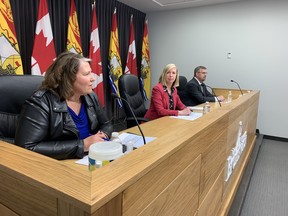Goals set for N.B. education 'action plan'
Recruitment, retention strategy will play a huge role: teachers

Article content
The province and teachers’ representatives have outlined how they intend to improve New Brunswick’s anglophone education system over the next five years, but there’s no evidence that anyone will be held accountable if goals aren’t met.
And the plan’s success will depend on enough staff being recruited and retained, according to the New Brunswick Teachers’ Association, something the province only allocated $604,000 to in its $1.8-billion spending plan for the 2024-2025 fiscal year.
The 11 recommendations, originally unveiled late last year by a committee made up of government and education officials, include pilot projects to improve classroom composition, moves to confront chronic absenteeism, efforts to improve literacy, and a renewed focus on helping underperforming students, and possibly holding them back until their grades improve.
Rough timelines, broken down into quarters of each fiscal year, were set for each goal, often with an accompanying note about “what success will look like.”
For example, on chronic absenteeism, the plan says success will be measured by whether there’s “a decrease in the number of chronically absent students.” No numbers are attached, suggesting success could be achieved by as little as a one per cent drop.
The plan was unveiled at a press conference in Fredericton on Tuesday morning.
New Brunswick Teachers’ Association executive director Ardith Shirley, and Dr. Tiffany Bastin, assistant deputy minister for the anglophone education sector, who co-chaired a committee that developed the plan, talked about how the improvements will be made, and in what areas.
Questioned about the lack of specific targets in the plan, Bastin said that work, by specially created project teams, will start soon.
“Once the work is underway, that’s where the evolution of the measures will come,” she said, adding that some draft targets have been created. Once the teams are up and running, more specific targets will be set, she said.
Education Minister Bill Hogan, who was also at Tuesday’s press conference, denied that the government’s controversial change to Policy 713, which sets gender rules in public schools, would have any negative impact on attempts to recruit teachers to work in New Brunswick. Typically, school districts have handled recruitment, he said, but now the province “wants to assist with that.”
Hogan declined to comment further because the Policy 713 fight is now before the courts, but reiterated that the Tories “remain committed to parental rights.”
On classroom composition rules, which are laid out in the collective agreement between the province and the New Brunswick Teachers’ Federation (NBTF), Hogan said the two parties are talking informally about that and that the NBTF understands that “perhaps there’s other ways to look at classroom composition, and being creative.”
Another option is to “embed” new language into the existing contract, which doesn’t expire until 2026, he said.
The plan’s 11 goals are:
- “Move to address the emerging critical concern of chronic absenteeism and reinforce a culture of learning by working with school districts and stakeholders to draft a provincial action plan on school attendance;
- “Develop a new classroom composition model and a reasonable timeline to implement an improved inclusive and equitable system;
- “Leverage technology to enhance learning and personalization;
- “Place a focus on middle school learners aged 11-14, by working to identify actions and programs to improve academic engagement, achievement, and well-being;
- “Establish a clear plan (benchmarks/goals) for strengthening French language learning in New Brunswick’s anglophone K-12 system, including expanding course options and opportunities for high school students, and exploring options for students entering French immersion with greater flexibility based on readiness;
- “Encourage movement and getting outside, including embedding 30 minutes of physical education for K-8 daily in addition to outdoor education opportunities;
- “Have the recently announced Centre of Excellence for Language Learning develop a communication plan and support plan to help families and communities assist children in their success in French immersion;
- “Improve retention and recruitment of qualified teachers and specialized health service professionals in education;
- “Support educational assistants in receiving dedicated training, professional learning, and opportunities to further collaborate with teachers;
- “Ensure teachers who work with early readers have specific training designed to maximize the development and outcomes of these students,” and;
- “Develop and implement equitable access to professional learning for educators in resources, strategies, and interventions to best support each learner in English Prime and French language classrooms.”











Postmedia is committed to maintaining a lively but civil forum for discussion. Please keep comments relevant and respectful. Comments may take up to an hour to appear on the site. You will receive an email if there is a reply to your comment, an update to a thread you follow or if a user you follow comments. Visit our Community Guidelines for more information.